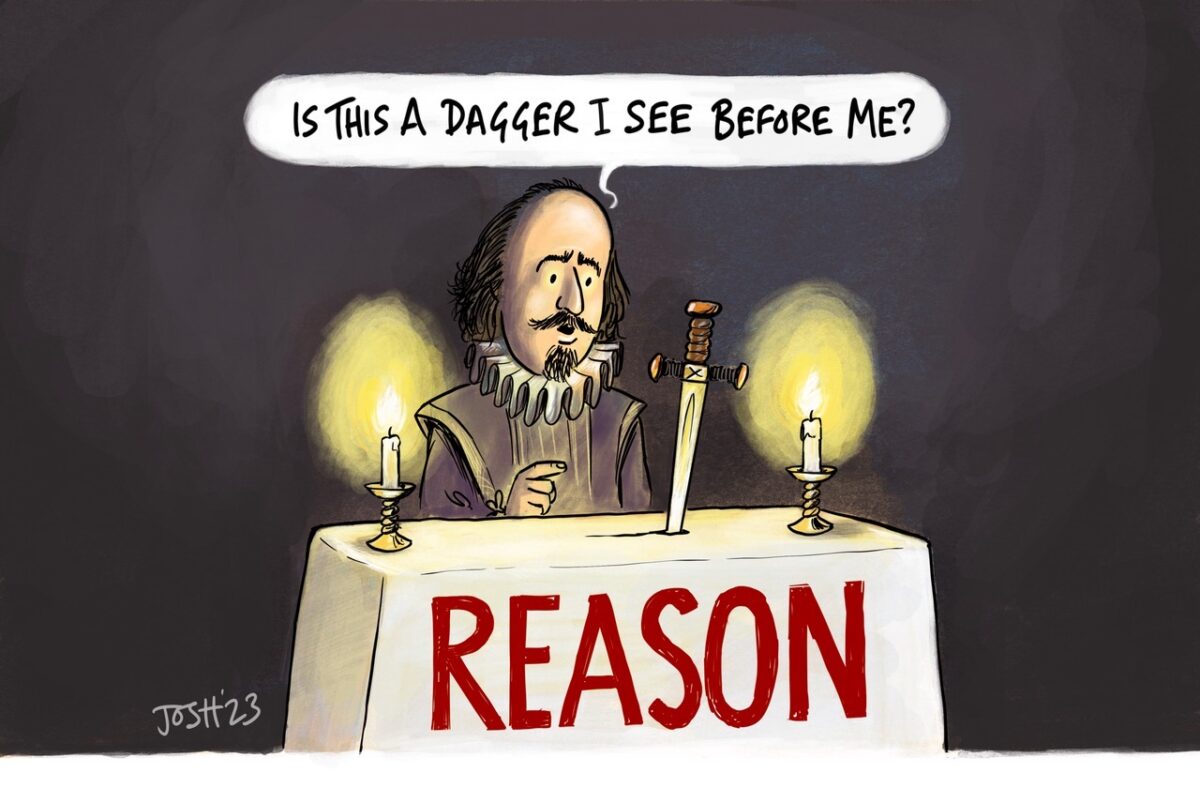
Illustration by Josh Cartoons
Politics, religion, and football. One misspeak can turn dinner party tranquility into tempest. Of course, religion doesn’t have to be faith in God: any deeply-held belief will do. The “Climate Crisis” and Net Zero agenda? What precipitated the tragic war in Ukraine? Covid’s origins and the Government’s response? Challenge the orthodoxy and find yourself a hated heretic. As G.K. Chesterton foretold in Heretics over a century ago, “Truths turn into dogmas the instant that they are disputed… The great march of mental destruction will go on… Everything will become a creed.” And the creepingly totalitarian efforts to control the disbelievers get worse. Take the muzzling of free speech as proposed by the UK’s Online Safety Bill and the “Twitter Files” revelations.
Turning a skeptical eye toward Shakespeare
Questioning the authorship of Shakespeare’s works is a rather more quaint and far less explosive example of heretical thought. For years, I took it for granted that the Bard had grown up in Stratford-upon-Avon, a medieval market town I know well in the rural English county of Warwickshire. Perhaps there was always a seed of doubt: as I came to experience the canon, I found it quite remarkable that a countrified commoner could have had such a grasp of the Classics and the aristocracy of the Italian Renaissance, together with a familiarity with the workings of the English nobility and the Elizabethan Royal Court. But we are told the man was a genius who mixed in the right circles so, I supposed that explained that…
You (and a cast of a thousand selfie-obsessed tourists) can visit plenty of perfectly preserved landmarks celebrating our National Poet’s life—his birthplace, his school, and his mother’s farm, to name a few. What’s more, in Stratford’s picture-perfect Holy Trinity Church, there exists a (rather hideous-looking) bust of the great playwright, feather quill pen and paper in hand. So, what is there to doubt?
But when one’s profession is to “unmask falsehood and bring truth to light,” proper scrutiny was inevitable. And it doesn’t take the mystical powers of Prospero to identify major flaws in the accepted narrative. Truth is, there’s no evidence that the man baptized as William Shakspere (that’s how he spelled his name) in Stratford in 1564, ever attended school. Nor is there evidence that he borrowed—let alone owned—any books. Indeed, there is no evidence that he was even literate, and we know for a fact his parents and daughters were unlettered. Neither is there any reference to his prolific writing by his contemporaries, nor by his son-in-law, an avid diarist, who did record the talents of a local poet.
There’s no mention of Shakespeare’s great works or plays in his own last will and testament. And any signatures attributed to him look like he had been “upon the rack” when committing them to paper, and certainly not like that of a masterful wordsmith. And the bust? Turns out the writing implements and the characteristic Cavalier mustache were additions to the original monument—which previously depicted its subject holding what appears to be a woolpack, implying his association with a non-literary trade.
But what of the venerated birthplace? The house where the man was born and grew up, so we are told. A fabrication of the nineteenth century. And his mother’s farm? More fiction. What are sold as preserved artifacts of the great playwright’s life are, in truth, theme park attractions seemingly assembled to “extort pecuniary gratuities from the credulous and unwary,” as one Georgian skeptic put it. The purveyors of the Stratfordian myth—who line their pockets with tourists’ millions—rely on propaganda masquerading as a historical artifact to sell their wares.
Yet dare challenge the heart-warming Shakespeare origin story, and you must be prepared to be hysterically admonished as a crank, a crackpot, or a “conspiracy theorist.” That latter ad hominem and vacuous attack is a favorite of the enforcers of consensus magisterium: deployed to short-circuit the need for reasoned rebuttal using supporting evidence and proper argument.
Daring to doubt
Ever more in today’s society, there is no desire to critically examine conventional wisdom: the majority view is true because the majority believes it to be true. And what is preached by approved Experts—the high priests of permitted beliefs—is axiomatically correct. Dissenting voices are nothing more than a malign influence to be silenced or burned at the stake of social ridicule and condemnation. This is of course, all well and good until the zealots’ testaments are proven wrong. For truth is truth, to the end of reckoning.
Whether or not the author of the wisdom-infused masterpieces we collectively refer to as “Shakespeare” is the man from Stratford will have little practical impact on us. The same cannot be said for other issues where the accepted “truth” will influence politics and policy to such an extent that our very lives and well-being will be affected, now and forevermore. For the sake of future generations, we must ensure our faith is not misplaced.
The Orwellian cult of Expertocracy seems on the relentless increase, last year seeing its zenith to date. It can only be kept in check by doubt and challenge. These two beacons can illuminate over-confidence, elucidate flawed assumptions, and in some cases, reveal plain malevolence. To accept unquestioningly is to sacrifice reason at the altar of self-proclaimed gods and to welcome tyranny.
As we begin the second month of the New Year, will we pause to listen for the rebuke of the wise? Or carry on regardless, at risk of being serenaded by fools?
Perhaps we could allow the occasional blasphemy. Entertain the unthinkable maverick. And welcome the heterodoxy so essential for a civilized and intelligent society.
Even if it does wreck the occasional dinner party.
Image Credit: Cartoons by Josh


